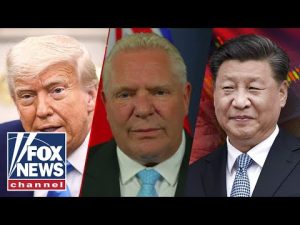**A Wake-Up Call from the Banking World: Are We Prepared for What Lies Ahead?**
In a world where social media often captures the headlines, it seems like the genuine concerns that should keep Americans up at night don’t always get the attention they deserve. From the alarming rise of anti-Semitism to the dangerous whispers of potential cyber threats, the need for a reality check has never been more crucial. Recently, a powerful voice from the financial sector rang the alarm bell, and it’s time we listen. Jaime Dimon, the CEO of JP Morgan Chase, made statements that went far beyond typical financial jargon. Instead, he presented a perspective that requires all of us to reassess our readiness for the future.
Dimon’s revelation wasn’t merely about fluctuating interest rates or the buzz around cryptocurrency; he delivered a sobering message focused on national security during a talk at the Reagan National Defense Forum in California. He stressed that rather than “stockpiling Bitcoin,” we should be thinking about tangible necessities like guns, bullets, and other essential military supplies. This isn’t your average financial advice—this is a wake-up call that highlights a looming threat. His comments underscore a stark and unsettling reality: our military preparedness might not be as robust as we wish. When facing potential conflicts, especially in volatile regions like the South China Sea, the thought of only having a week’s worth of munitions is more than just a little concerning.
As Americans continue navigating the complexities of our modern world, Dimon’s emphasis on preparation and reality could not be clearer. While many financial leaders focus on trending topics, Dimon shines a light on the uncomfortable truth that the security of our nation may depend on more than our digital assets. The larger narrative suggests that we must prioritize self-reliance and re-evaluate our priorities. This is a call to arms, not just metaphorically, but in terms of being ready for any eventualities that might disrupt our daily lives.
Amidst the chaos, it’s crucial to remember that tangible resources such as food, energy, and protection can often be a matter of survival. Dimon’s points push us to think critically about our dependence on digital conveniences and the collection of intangibles we’ve built our wealth upon. As societal norms shift and the world becomes less stable, it might be wise for everyday Americans to stock up on essentials, not just Bitcoin. The question we must ask ourselves is: how prepared are we really? What if a cyber-attack knocks out our electricity for weeks? Would our current systems hold up under such pressure?
The stakes are high, and while Dimon’s message was directed at regulators and CEOs, it resonates with everyone. It serves not just as a warning but as an invitation to understand our vulnerabilities. Celebrate our virtues, understand our flaws, and above all, be prepared. We shouldn’t be caught off guard when unexpected troubles arise. Whether it be food insecurity, loss of energy resources, or disrupted communication systems, every American needs to consider their role in building a more self-reliant community.
In conclusion, Jaime Dimon isn’t advocating for panic, but rather for awareness. His stark message reminds us that while conveniences may crumble, our ability to adapt and respond to real-life challenges will ultimately determine our success as a society. Let’s take this opportunity to prepare, remain vigilant, and ensure we’re ready for whatever tomorrow may hold. After all, isn’t that what being a responsible citizen is truly about? Embrace the reality of stockpiling necessary resources over clouded investments, and may we all strive to be better equipped for the future!







